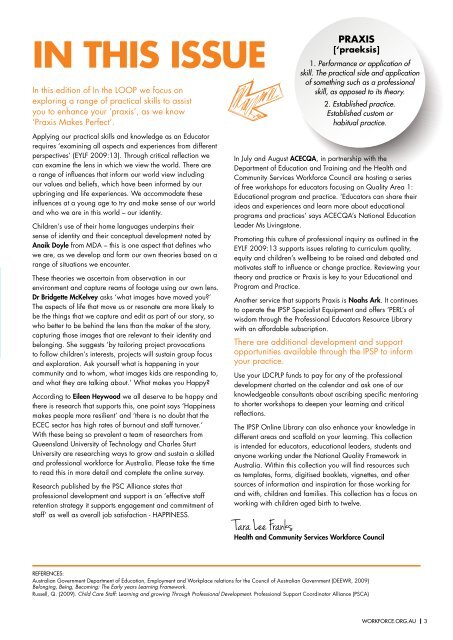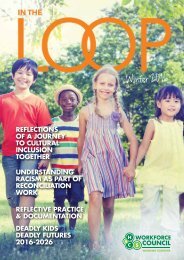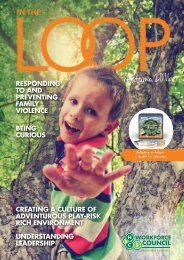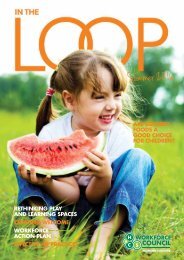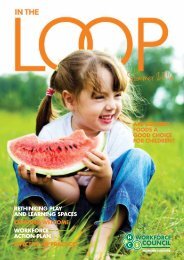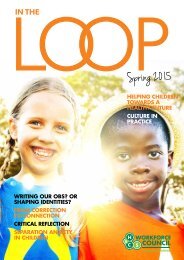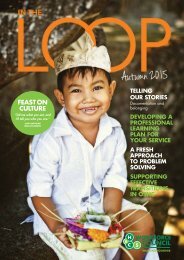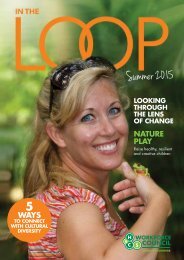Winter 2015
Create successful ePaper yourself
Turn your PDF publications into a flip-book with our unique Google optimized e-Paper software.
IN THIS ISSUE<br />
In this edition of In the LOOP we focus on<br />
exploring a range of practical skills to assist<br />
you to enhance your ‘praxis’, as we know<br />
‘Praxis Makes Perfect’.<br />
Applying our practical skills and knowledge as an Educator<br />
requires ‘examining all aspects and experiences from different<br />
perspectives’ (EYLF 2009:13). Through critical reflection we<br />
can examine the lens in which we view the world. There are<br />
a range of influences that inform our world view including<br />
our values and beliefs, which have been informed by our<br />
upbringing and life experiences. We accommodate these<br />
influences at a young age to try and make sense of our world<br />
and who we are in this world – our identity.<br />
Children’s use of their home languages underpins their<br />
sense of identity and their conceptual development noted by<br />
Anaik Doyle from MDA – this is one aspect that defines who<br />
we are, as we develop and form our own theories based on a<br />
range of situations we encounter.<br />
These theories we ascertain from observation in our<br />
environment and capture reams of footage using our own lens.<br />
Dr Bridgette McKelvey asks ‘what images have moved you?’<br />
The aspects of life that move us or resonate are more likely to<br />
be the things that we capture and edit as part of our story, so<br />
who better to be behind the lens than the maker of the story,<br />
capturing those images that are relevant to their identity and<br />
belonging. She suggests ‘by tailoring project provocations<br />
to follow children’s interests, projects will sustain group focus<br />
and exploration. Ask yourself what is happening in your<br />
community and to whom, what images kids are responding to,<br />
and what they are talking about.’ What makes you Happy?<br />
According to Eileen Heywood we all deserve to be happy and<br />
there is research that supports this, one point says ‘Happiness<br />
makes people more resilient’ and ‘there is no doubt that the<br />
ECEC sector has high rates of burnout and staff turnover.’<br />
With these being so prevalent a team of researchers from<br />
Queensland University of Technology and Charles Sturt<br />
University are researching ways to grow and sustain a skilled<br />
and professional workforce for Australia. Please take the time<br />
to read this in more detail and complete the online survey.<br />
Research published by the PSC Alliance states that<br />
professional development and support is an ‘effective staff<br />
retention strategy it supports engagement and commitment of<br />
staff’ as well as overall job satisfaction - HAPPINESS.<br />
PRAXIS<br />
[‘praeksis]<br />
1. Performance or application of<br />
skill. The practical side and application<br />
of something such as a professional<br />
skill, as opposed to its theory.<br />
2. Established practice.<br />
Established custom or<br />
habitual practice.<br />
In July and August ACECQA, in partnership with the<br />
Department of Education and Training and the Health and<br />
Community Services Workforce Council are hosting a series<br />
of free workshops for educators focusing on Quality Area 1:<br />
Educational program and practice. ‘Educators can share their<br />
ideas and experiences and learn more about educational<br />
programs and practices’ says ACECQA’s National Education<br />
Leader Ms Livingstone.<br />
Promoting this culture of professional inquiry as outlined in the<br />
EYLF 2009:13 supports issues relating to curriculum quality,<br />
equity and children’s wellbeing to be raised and debated and<br />
motivates staff to influence or change practice. Reviewing your<br />
theory and practice or Praxis is key to your Educational and<br />
Program and Practice.<br />
Another service that supports Praxis is Noahs Ark. It continues<br />
to operate the IPSP Specialist Equipment and offers ‘PERL’s of<br />
wisdom through the Professional Educators Resource Library<br />
with an affordable subscription.<br />
There are additional development and support<br />
opportunities available through the IPSP to inform<br />
your practice.<br />
Use your LDCPLP funds to pay for any of the professional<br />
development charted on the calendar and ask one of our<br />
knowledgeable consultants about ascribing specific mentoring<br />
to shorter workshops to deepen your learning and critical<br />
reflections.<br />
The IPSP Online Library can also enhance your knowledge in<br />
different areas and scaffold on your learning. This collection<br />
is intended for educators, educational leaders, students and<br />
anyone working under the National Quality Framework in<br />
Australia. Within this collection you will find resources such<br />
as templates, forms, digitised booklets, vignettes, and other<br />
sources of information and inspiration for those working for<br />
and with, children and families. This collection has a focus on<br />
working with children aged birth to twelve.<br />
Tara Lee Franks<br />
Health and Community Services Workforce Council<br />
REFERENCES:<br />
Australian Government Department of Education, Employment and Workplace relations for the Council of Australian Government (DEEWR, 2009)<br />
Belonging, Being, Becoming: The Early years Learning Framework.<br />
Russell, Q. (2009). Child Care Staff: Learning and growing Through Professional Development. Professional Support Coordinator Alliance (PSCA)<br />
WORKFORCE.ORG.AU 3


